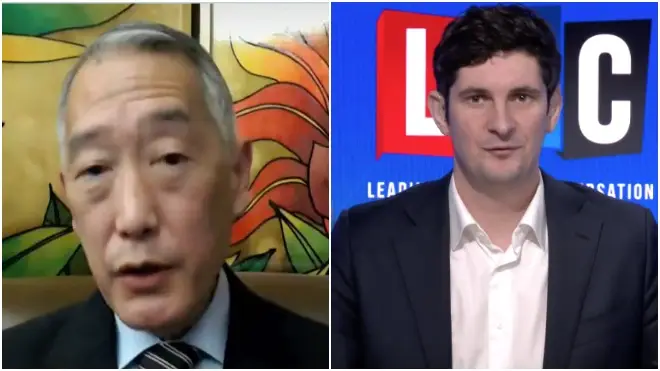
Clive Bull 1am - 4am
31 January 2021, 12:25 | Updated: 31 January 2021, 13:33

Withholding vaccines could cost $5 trillion globally
The Director-General of the International Vaccine Institute has told LBC it will be 2023 "by the time we will have enough vaccines around the world to end the transmission of Covid-19."
Dr Jerome Kim told LBC's Swarbrick on Sunday: "There is a big problem with high income countries taking exclusively the first two billion doses.
"The modelling would suggest that if we do that, global Covid deaths will double which would be a horrible thing.
"The other part of this is economic. If these countries exclusively take all the doses first then it could cost us four to five trillion dollars as the world is trying to catch up with disruptions to trade and the economies of other countries.
He continued: "So we have to have some form of equitable distribution.
"But one of the problems is that many of the vaccines that were approved initially by the WHO are actually difficult to use in countries that don't have the appropriate cold chains.
"But we know that vaccinating efficiently is one of the ways that we can control the emergence of mutants, decrease hospitalisations and take pressure off the healthcare systems."

WHO spokeswoman Margaret Harris said she wanted to appeal to people in the UK, telling them "you can wait", because ensuring equitable global distribution is "clearly morally the right thing to do".
Prime Minister Boris Johnson has said he aims to offer all UK adults a first dose by autumn, but the WHO has said countries should be aiming for "two billion doses" to be "fairly distributed" around the world by the end of 2021.
The UK currently has one of the highest levels of vaccine coverage, along with Israel and the UAE, but many poorer countries are yet to start any immunisations.

Director of International Vaccine Institute: 2023 will end pandemic
Tom pushed Dr Kim further on this, asking what he would say to people when it is their parent or grandparent that would benefit from the vaccine rollout in the UK.
Dr Kim replied: "It is going to be difficult in the first months of 2021, because supply is catching up with demand.
"The message should be vaccinate, but wear masks and distance until we start to see an impact."
Asked when the world could be looking at a time enough of the population is vaccinated to end the transmission, Dr Kim said: "Assuming that we can get into a proper vaccination programme by mid fall, we can expect to see social distancing and face masks for at least another year.
"We have vaccines, we know that they work, it's a matter of getting enough supply out there around the world.
"Everyone needs the vaccine, we need to vaccinate 8 million people, but some countries have over ordered the vaccine. We need to start to understand the supply chain and allocate them to parts of the world that need a vaccine solution.
"And eventually, maybe by 2023, we will have enough vaccines around the world to end the transmission of this Covid-19 virus."

COG-UK Director: World is in store for 'a lifetime' of Covid-19
His views were supported by Professor Sharon Peacock, Executive Director of the Covid-19 Genomics UK Consortium and Professor of Public Health and Microbiology at the University of Cambridge, who said: "A new variant is likely to arise, yes."
Asked if we will have social distancing and masks for the foreseeable future, the SAGE member replied: "I think it is spot on that we will.
"What we're looking at is a lifetime of dealing with this virus – it's not going away anytime soon. I don't think it's going to mutate itself out of existence any time soon.
"So we need to look at vaccines and modify them over time to deal with mutations that are thrown at us.
"This is going to be a long term issue of become wise to which mutations are important and which can be safely ignored and looking at variants, aiming to contain them when they arise and tweaking and modifying vaccines so they are effective against new variants."